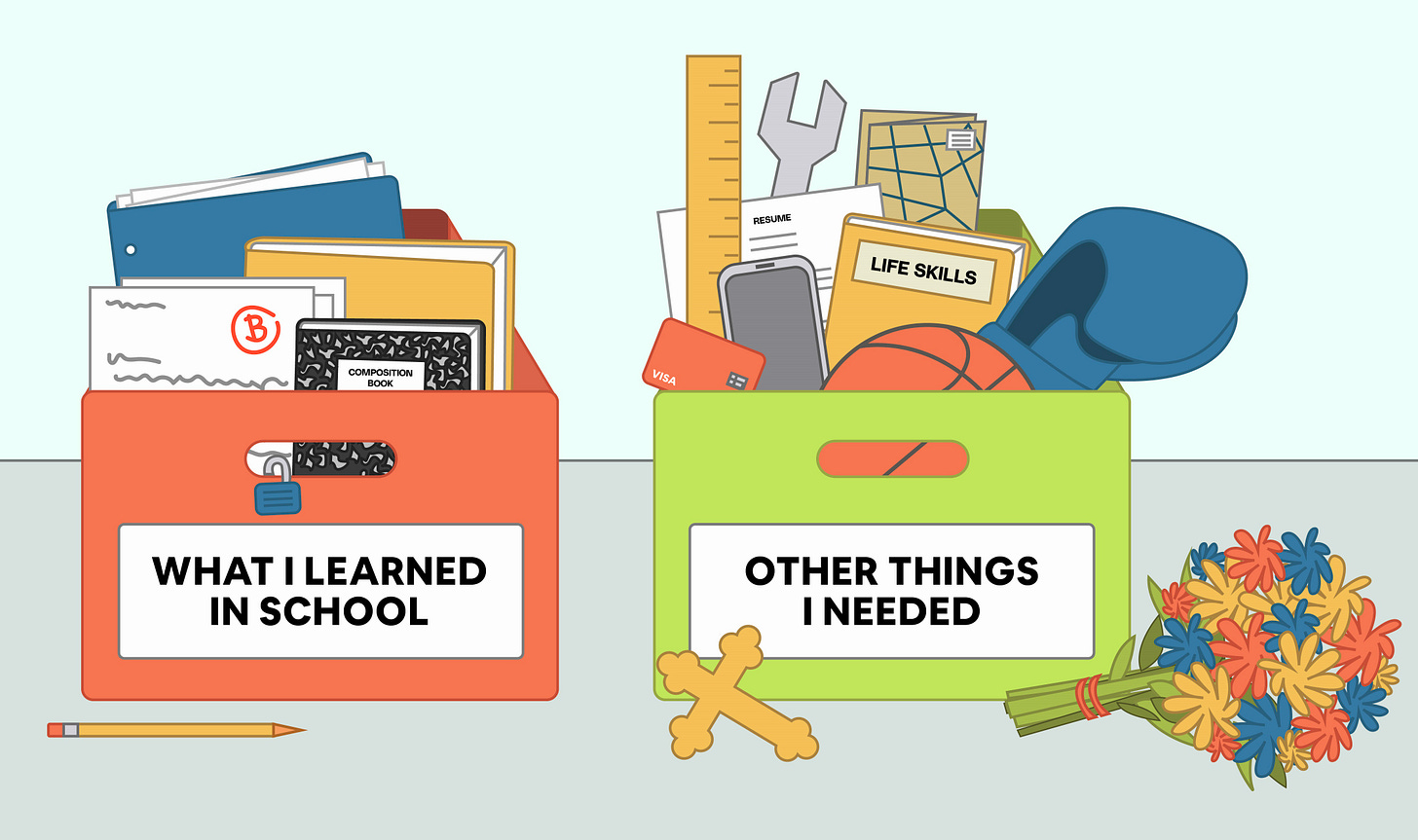What conventional high schools don't teach, but maybe should. (Your opinions, please.)
We'll start with our list.
Have you ever felt that something was missing in your schooling?
The conventional approach to education in the United States seems to have been designed to prepare the average student (if such a thing exists) to play a role in a predominately corporate / industrial society. A growing number of people recognize that the prevailing educational model is not necessarily as apropos to current circumstances as it once was.
One symptom? Some things that should or could be taught today, are not.
Like what? Well, here are a few of the practical things that we plan to teach at LaunchPoint Academy, that you might not get instruction on in a typical school:
how to start a business
how to change a tire
how to fight (literally and figuratively)
how to pray
philosophy
life skills
life hacks
how to parse the news
“how to read a friggin’ contract filled with legal terms” (as one Reddit user put it)
the art of persuasion
the trades
how to navigate in public spaces (literally and figuratively)
how to learn
That’s our list, at least for now!
What would you add? What did you not learn in high school, that you wish you had?


I would also add emotional intelligence. How to forgive, how to love, how to empathise. Role plays, group discussions, improv.
I think you'd like the work of the well-known educationist Guy Claxton
Quoting from Perplexity.ai
"Guy Claxton, a renowned education expert, recommends that children should learn in school through an approach he calls "Building Learning Power" (BLP). His main recommendations focus on developing students into better, more independent learners—not just improving their ability to pass tests. Here are the key aspects of Claxton’s recommendations:
- **Cultivate Habits and Attitudes for Lifelong Learning:** Schools should create a climate that systematically develops qualities such as tenacity, resourcefulness, imagination, self-discipline, self-awareness, collaboration, and curiosity, so students face challenges calmly and creatively rather than with anxiety
- **Shift from Spoon-Feeding to Independent Learning:** Claxton argues that supporting students too much (spoon-feeding) may produce short-term results but does not build their ability to learn independently. Instead, teaching should help students become resilient and resourceful learners who can deal with difficulty on their own.
- **Teacher as Coach ("Guide by Their Side")**: Rather than always stepping in to help, adults should act as learning coaches, giving children time to solve problems on their own, asking exploratory questions, and encouraging curiosity and creativity. The focus should be on helping students develop learning habits and strategies, not just providing answers.
- **Foster Curiosity and Questioning:** Make a habit of asking lots of questions and encourage children to do the same. This helps students see mistakes and challenges as opportunities for learning, building their confidence and interest in problem-solving.
- **Don't Label or Limit Students:** Avoid boxing children into certain identities based on early aptitudes or interests. Give them space to explore a wide range of possibilities, supporting their passions as they emerge.
- **Emphasize Learning Skills:** Key skills to develop include observing, reasoning, experimenting, reflecting, practising, collaborating, planning, and knowing how to learn new things. These underpin “learning how to learn” and are seen as essential for thriving in an unpredictable future
- **Involve Students in Their Own Learning Journey:** Encourage reflection and meta-learning—helping students understand what they’re good at, when they need help, and how they learn best. This builds lifelong learning power
- **Learning Challenges:** Use tasks of varied difficulty (sometimes called “chili challenges”) to keep students in their optimal learning zone—tasks that are challenging but manageable. Allow students to choose and switch tasks to encourage resilience and adaptability
- **Build from Strengths:** Help students recognize and extend their strengths, using these as a foundation to build confidence and take on new challenges-
Claxton’s approach ultimately aims to prepare children not just for exams, but for lifelong learning, adaptability, and well-being—ensuring they leave school confident, competent, and curious.
See also any of the many YouTubes featuring the late lamented Sir Ken Robinson, like this one. He is very witty and has SO much to say about education.
https://www.youtube.com/watch?v=HpCIQKSqDd4